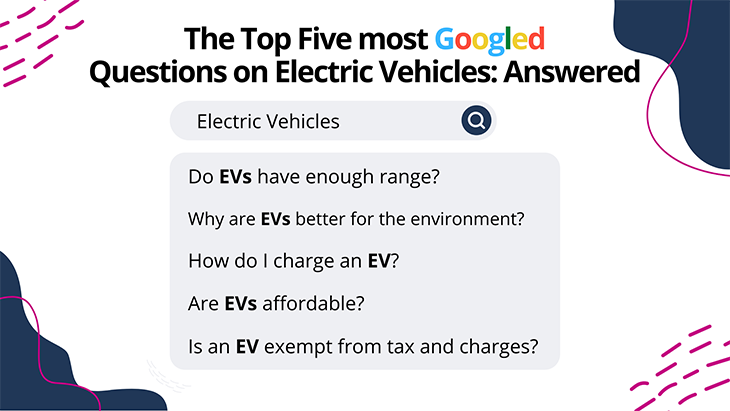With the ban of new petrol and diesel cars in 2030 looming closer and closer, EV alternatives will soon become common place on our roads. If you’re looking at buying a new car, why not look at an electric alternative? But to help you decide if it’s right for you, here’s some of the most common questions about EVs answered.
Do EVs have enough range?
While some of the early generation of electric vehicles had limited ranges, current models typically offer at least 150 miles of range. With 98 percent of vehicle journeys in England being less than 50 miles long, any EV on sale today is comfortably within range!
Why are EVs better for the environment?
Electric vehicles reduce greenhouse gas emissions by half, regardless of how the energy needed to charge them is generated. And if you can charge your EV with renewable energy, you can reduce your emissions even more. EVs are now greener than internal combustion engine rivals and will only get cleaner in the future, when battery production, battery recycling, and energy generation are all taken into account.
How do I charge an EV?
It just takes a few seconds to charge an electric vehicle: the time it takes you to plug your car in before you go do something else. Because vehicles spend 90% of their time parked, there is plenty of opportunity to charge while on the road. You won't have to worry about not being able to locate a charger when you're out and about in the UK, as the UK has more charging stations than any other country in Europe. With the growth of charging infrastructure and the inclusion of required charging connections in all new houses, there will be a plethora of charging alternatives. An electric vehicle can be charged in as little as 30 minutes or as long as 12 hours. This is dependent on the battery's size and the charging station's pace. With a 7kW charging outlet, a typical electric car (60kWh battery) takes little under 8 hours to charge from empty to full. With a 50kW rapid charger, for many electric cars, you can add up to 100 miles of range in under 35 minutes. Most drivers tend to “Top Up” charge rather than waiting for their battery to recharge from empty to full.
Are EVs affordable?
EVs, like petrol or diesel cars, are available at a variety of different price points. With some starting from £18,000. With the actual vehicles being priced competitively against their combustion engine counterparts, EVs come out top when you look at running costs. Electricity is cheaper than petrol or diesel, and EV maintenance costs are less as engines are simpler. As a results, the annual cost for running a pure electric car is about 10% lower than for petrol or diesel cars.
Is an EV exempt from congestion charge and road tax?
Fully electric vehicles and most plug-in hybrids are currently exempt from the congestion charges, however, from the end of October 2021, plug-in hybrid models will be dropped and only fully electric or hydrogen fuel cell vehicles will be eligible for the 100% discount. Fully electric vehicles are also completely exempt from road tax as they have zero emissions, and plug-in hybrid electric vehicles pay a reduced rate.
Get your electric car
If you’re considering getting a new car, then why not apply with Creditplus?





 Facebook
Facebook Twitter
Twitter Instagram
Instagram LinkedIn
LinkedIn Youtube
Youtube